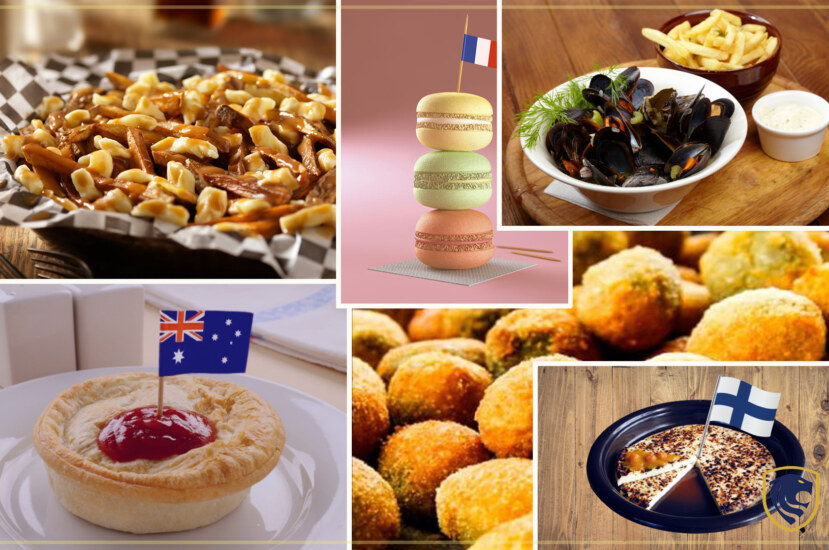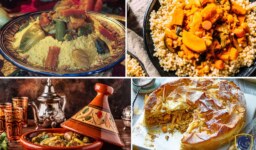Are you that person who loves to try out the cuisine that belongs to every place you travel? So, this article will be a great guide for your food journey. Traditional food from different parts of the world contains unique flavors and aromas. In addition, some dishes have their legends. Today we are going to explore the most delicious food around the world that you must try.
Australian Meat pie
In many food cultures, pie recipes are sweet and can be used as a dessert or snack. But in Australia, they make a pie out of meat. Most of One of the most well-known dishes in Australian cuisine is the famous Australian Meat Pie. Shortcrust pastry with chunky bits of beef cooked slowly in a thick sauce topped with golden puff pastry. Everyone fortunate enough to sample an Australian meat pie will view this as a bloody legend. When you bite into the buttery, flaky, golden puff pastry the molten filling oozes out. Probably you will frantically fan your mouth while muttering, “Hot, hot, hot!”. Cursing yourself for not letting it cool down, but on the other hand, the pie is irresistible that you don’t bloody care about third-degree mouth burns.
Belgium: Moules Frites
In Belgium, fries and mussels are just as popular as burgers and fries in the US. A simple way to get started is to get basic, steamed mussels or add extra spice, such as curry powder. Although popular all across the world, Moules-Frites are thought to have originated in Belgium. When there was no fish or other accessible food during the winter, this was frequently consumed across the region. Depending on the season, Moules-Frites are offered at the majority of restaurants in both France and Belgium. According to a TNS study, magret de canard, which garnered 21% of the vote, just edged out Moules-Frites, which received 20% of the vote, as the nation’s second favorite meal. Belgium consumes between 25 and 30 tonnes of mussels as Moules-Frites annually on average. The majority of the mussels eaten in Belgium originate from neighboring mussel farms in Zeeland, Netherlands.
Canada: Poutine
One of the most iconic Canadian foods is poutine, a delightful and delectable combination of fries, gravy, and cheese curds. The cheese curds are what poutine is known for. What distinguishes “genuine” poutine is real cheese curds. Simply said, cheese curds are chunks of curdled milk that can be eaten alone as a snack or, in Canada, combined with gravy and fries to form poutine. Even if the US sells this tasty food, you should taste it when in Canada. Because there some eateries provide more than 100 options.

Australian Meat pie, Belgium- Moules Frites, Canada- Poutine
England: Steak and Kidney Pie
In a traditional British meal called steak and kidney pie, diced beef, onions, and kidneys, usually from lamb or pig, are cooked in brown gravy before being wrapped in pastry and baked. Occasionally, mushrooms and bacon are added, and a variety of ales, most notably stout, can be added to the gravy. In many cases, the British duo of pie and mash is paired with chips, They form the perfect side dish to a steak and kidney pie. They are glassy, crunchy, and tactile.
Finland: Squeaky Cheese
Finnish squeaky cheese is a type of fresh cheese traditionally manufactured in Finland from the rich, recently-calved cow’s beestings. Goat milk or reindeer milk can be also used to prepare this traditional food. Commercially accessible versions frequently contain cow’s milk, which deprives them of part of the color and flavor. Northern Finland, Kainuu, and Southern Ostrobothnia are where the cheese originated from. Leipäjuusto, often known as squeaky cheese from Finland. Probably the only place to find the original squeaky cheese dish is in Finland. The mild cheese is typically pan-fried and served as a dessert with cloudberry jam or with a wonderful cup of coffee.
France: Macarons
One of the most popular sweet treats all around the world is French macaron. They may be found in the most elite settings and are available in practically every color and flavor. The popularity of macarons is largely a result of their past. French macarons have a long history. In reality, it all began with Catherine De Médicis’s journey from Italy to France in the 1600s. She wanted to bring her favorite dessert, “Macaroni,” to France because she was going to marry the king there. The shell of the modern macaron is a macaroni. Instead of the desert, we are used to, it is more akin to a dry “galette.” This colorful food contains simple ingredients but it is so difficult to prepare. Party cookies are another name for macarons. Their elegant appearance will assist in embellishing your dessert table for this important occasion.

England- Steak and Kidney Pie, Finland- Squeaky Cheese, France- Macarons
Greece: Spanakopita
One of the world’s most well-known and popular Greek foods is panakopita or Greek spinach pie. A highly adaptable and delectable recipe that may be served as a main dish, appetizer, or mid-afternoon snack at any time of day! Moreover, this is a popular vegetarian treat. Onions, dill, spring onions, and eggs can all be added to the spinach-feta mixture. The eggs bind the mixture and aid in achieving the ideal spanakopita filling texture.
There are several sizes and forms available for this dish. It can either be prepared in a big pan and divided into little sections (pan-sized spanakopita) or rolled into small triangular chunks (spanakopitakia). Naturally, spinach is the major component required to produce this spanakopita dish. Feta cheese, a popular component in all Greek cuisines, is also utilized in the majority of spanakopita recipes. Feta cheese is often baked, fried, or used as stuffing until it is well softened and just melted.
Hungary: Goulash
The “Hungarian Goulash” is a tasty beef soup or stew with a thick paprika-seasoned broth. This meal is delicious and perfect for a chilly day. To soak up any broth that might be left in your dish, serve this with homemade noodles (or potatoes) and toast or biscuits on the side. In this straightforward Hungarian Goulash recipe, soft beef chunks, onions, and tomatoes are cooked to perfection in a delicious beef broth. The aroma of this stew filling the house is perhaps the most comforting way to bid my terrace farewell till next season.
Because this food was prepared during grueling livestock drives, goulash means “Herdsman” in Hungarian. However, it wasn’t until the Turks conquered and introduced paprika to the nation around the 16th century that the meaty stew acquired its deep red hue.
Italy: Deep-Fried Olives
Ascolina olives are delectable packed green olives that are deep-fried and originate from the city of Ascoli in the Le Marche region of central Italy. The Italian aperitivo is known for its Ascolana Olives. Most people like their aperitivo with a Spritz of Negroni and some bread or piadina as a snack.

Greece- Spanakopita, Hungary- Goulash, Italy- Deep-Fried Olives
They are said to have been created by rich households’ cooks as a means to recycle leftover, uneaten meat. In actuality, various types of meat, including beef, hog, and chicken, are packed within the olives and cooked in soffritto and white wine.
Japan: Ramen
Ramen is a Japanese soupy noodle dish made with a variety of noodles, a richly flavorful broth, and a choice of meats or vegetables, frequently topped with a cooked egg. Both World Wars and Japan’s industrialization are connected to ramen. Ramen changed from being a dish loved by suburban communities to one that was popular among young people. Furthermore, Japan’s need for food during the Second World War allowed it to endure the system of food restriction.
The most popular Ramen type in Japan is Shoyu Ramen. The soup base for shoyu ramen, which is commonly chicken broth, is seasoned with soy sauce. It is the kind of ramen that is most popular in Japan.




